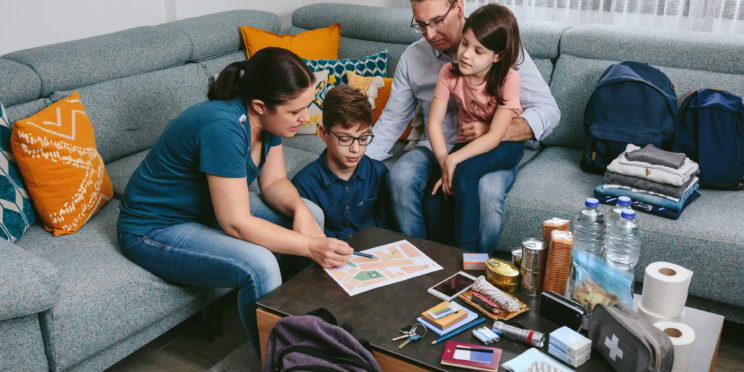A little planning can go a long way to keep your family safe during and after a disaster.
Before:
- Communicate. Talk with your family about who to call, where to go, and what to do if disaster strikes.
- Educate. Plan different strategies for different situations. Map out a fire escape route from all areas of your home, and establish a safe place to go during threatening weather. Make sure all family members, especially children, know their full name, address, and phone numbers. Agree on an out-of-town relative or friend to call if anyone gets separated during a disaster, and have an ICE (In Case of Emergency) contact in your cell phone that first responders can call if needed.
- Prepare. Set up warning systems in your home—fire detectors and carbon monoxide alarms give advance notice that can save lives. Use a battery-operated weather radio for advance storm warnings, and subscribe to your local Office of Emergency Management alerts by text or email if available. Download Singing River Electric’s SmartHub app—the fastest way to report a power outage. Keep an emergency kit handy that contains five days’ worth of non-perishable food and water, medical supplies, a list of phone numbers, prescriptions, and important documents. Also, plan for pets and any special needs for family members. Then practice your emergency plans.
During:
- Keep calm. Think clearly and follow your plan. Use the resources you prepared in case of emergencies.
- Have extra battery power for phones. Keep a few (charged!) power banks on hand so you can charge at least one phone. During extended outages, use the phone sparingly to reserve power.
After:
- Be patient. Wait for all danger to pass. Never re-enter an evacuated area without permission to do so, and remember to use caution when you do go back into your home—you can’t always see danger, such as a ruptured gas line. Use the SmartHub app to report power outages.
- Avoid delayed danger. Do not approach downed wires or power lines, and watch for rising waters. Keep standby generators in well-ventilated areas—never run a generator indoors, even in a garage. Do not connect a generator directly to your home’s wiring; this can energize power lines and put our linemen at risk.
With a little planning, the worst can be avoided during major storms and disasters. Visit our storm and outage page, redcross.org, and ready.gov for more disaster planning ideas. Taking the time to be prepared is worth the effort now in case of an emergency later.
Singing River Electric has an 84-year heritage of providing safe, reliable and affordable electricity to our local communities where we call home. SRE serves more than 78,000 meters across 7,651 miles of power lines in seven counties in Mississippi (Jackson, George, Greene, Perry, Stone, Wayne and Harrison) and two counties in Alabama (Mobile and Washington). The electric distribution cooperative works with Cooperative Energy to provide its members a diverse mix of generation resources including five small-scale solar sites locally and a 540-acre solar site in Lamar County. For more information, follow our conversations on Facebook, Twitter and Instagram.


